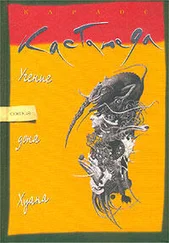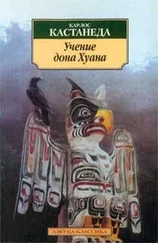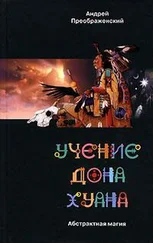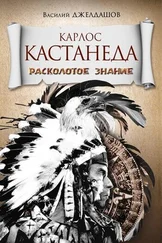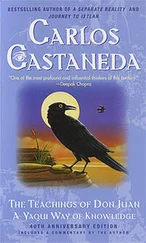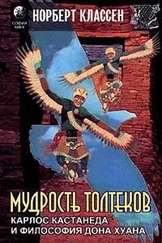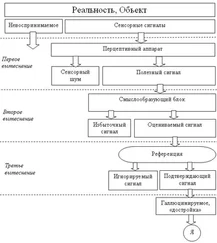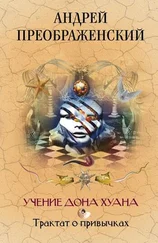Карлос Кастанеда
Учения дона Хуана: Знание индейцев Яки
Carlos Castaneda
The Teachings of Don Juan: A Yaqui Way of Knowledge
The Author's Commentaries on the Occasion of the Thirtieth Year of
Publication of The Teachings of Don Juan: A Yaqui Way of Knowledge
The Teachings of Don Juan: A Yaqui Way of Knowledge was first published in 1968. On the occasion of its thirtieth year of publication, I would like to make a few clarifications about the work itself, and to state some general conclusions about the subject of the book at which I have arrived, after years of serious and consistent effort. The book came as a result of anthropological field work which I did in the state of Arizona and in the state of Sonora, Mexico. While doing graduate work in the Anthropology Department at the University of California at Los Angeles, I happened to meet an old shaman, a Yaqui Indian from the state of Sonora, Mexico. His name was Juan Matus.
I consulted with various professors of the Anthropology Department about the possibility of doing anthropological field work, using the old shaman as a key informant. Every one of those professors tried to dissuade me, on the basis of their conviction that before thinking about doing field work, I had to give priority to the required load of academic subjects, in general, and to the formalities of graduate work, such as written and oral examinations. The professors were absolutely right. It didn't take any persuasion on their part for me to see the logic of their advice.
There was, however, one professor, Dr. Clement Meighan, who openly spurred my interest in doing field work. He is the person to whom I must give full credit for inspiring me to carry out anthropological research. He was the only one who urged me to immerse myself as deeply as I could into the possibility that had opened up for me. His urging was based on his personal field experiences as an archaeologist. He told me that he had found out, through his work, that time was of the essence, and that there was very little of it left before enormous and complex areas of knowledge attained by cultures in decline would be lost forever under the impact of modern technology and philosophical drives. He put to me as an example the work of some established anthropologists of the turn of the century, and the early part of the twentieth century, who collected ethnographic data as hurriedly but as methodically as possible on the cultures of the American Indians of the plains, or of California. Their haste was justified, because in a matter of one generation, the sources of information about most of those native cultures were obliterated, especially among the Indian cultures of California.
At the same time all this was happening, I had the good fortune of attending classes with Professor Harold Garfinkel of the Sociology Department at UCLA. He supplied me with the most extraordinary ethnomethodological paradigm, in which the practical actions of everyday life were a bona fide subject for philosophical discourse; and any phenomenon being researched had to be examined in its own light and according to its own regulations and consistencies. If there were any laws or rules to be exacted, those laws and rules would have to be proper to the phenomenon itself. Therefore, the practical actions of shamans, viewed as a coherent system with its own regulations and configurations, were a solid subject for serious inquiry. Such an inquiry didn't have to be subject to theories built a priori, or to comparisons with material obtained under the auspices of a different philosophical rationale.
Under the influence of these two professors, I became deeply involved in my field work. My two driving forces, drawn from my contact with those two men, were: that there was very little time left for the thought processes of the Native American cultures to remain standing before everything was going to be obliterated into the mishmash of modern technology; and that the phenomenon under observation, whatever it may have been, was a bona fide subject for inquiry, and deserved my utmost care and seriousness.
I dove into my field work so deeply that I am sure that in the end, I disappointed the very people who were sponsoring me. I ended up in a field that was no man's land. It was not the subject of anthropology or sociology, or philosophy, or religion, for that matter. I had followed the phenomena's own regulations and configurations, but I didn't have the ability to emerge at a safe place. Therefore, I compromised my total effort by falling off the adequate academic scales for measuring its worth or its lack of it.
The irreducible description of what I did in the field would be to say that the Yaqui Indian sorcerer, don Juan Matus, introduced me into the cognition of the shamans of ancient Mexico. By cognition , it is meant the processes responsible for the awareness of everyday life, processes which include memory, experience, perception, and the expert use of any given syntax. The idea of cognition was, at that time, my most powerful stumbling block. It was inconceivable for me, as an educated Western man, that cognition , as it is defined in the philosophical discourse of our day, could be anything besides a homogeneous, all-engulfing affair for the totality of mankind. Western man is willing to consider cultural differences that would account for quaint ways of describing phenomena, but cultural differences could not possibly account for processes of memory, experience, perception, and the expert use of language to be anything other than the processes known to us. In other words, for Western man, there is only cognition as a group of general processes.
For the sorcerers of don Juan's lineage, however, there is the cognition of modern man, and there is the cognition of the shamans of ancient Mexico. Don Juan considered these two to be entire worlds of everyday life which were intrinsically different from one another. At a given moment, unbeknownst to me, my task mysteriously shifted from the mere gathering of anthropological data to the internalization of the new cognitive processes of the shamans' world.
A genuine internalization of such rationales entails a transformation, a different response to the world of everyday life. Shamans found out that the initial thrust of this transformation always occurs as an intellectual allegiance to something that appears to be merely a concept, but which has unsuspectedly powerful undercurrents. This was best described by don Juan when he said, "The world of everyday life cannot ever be taken as something personal that has power over us, something that could make us, or destroy us, because man's battlefield is not in his strife with the world around him. His battlefield is over the horizon, in an area which is unthinkable for an average man, the area where man ceases to be a man ."
He explained those statements, saying that it was energetically imperative for human beings to realize that the only thing that matters is their encounter with infinity . Don Juan could not reduce the term infinity to a more manageable description. He said that it was energetically irreducible. It was something that could not be personified or even alluded to, except in such vague terms as infinity , ‘ lo infinito .’
Little did I know at that time that don Juan was not giving me just an appealing intellectual description; he was describing something he called an energetic fact . Energetic facts , for him, were the conclusions that he and the other shamans of his lineage arrived at when they engaged in a function which they called seeing : the act of perceiving energy directly as it flows in the universe. The capacity to perceive energy in this manner is one of the culminating points of shamanism.
Читать дальше

